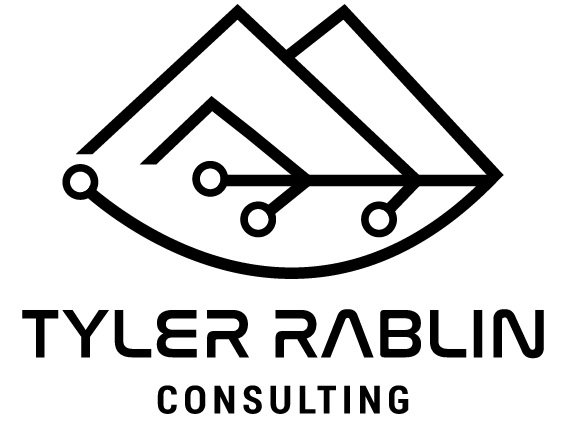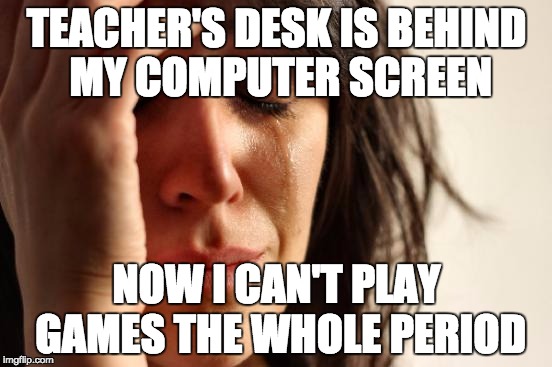Teaching the Jetsons: Classroom Management in a Digital Age
Gone are the days of catching students passing notes down a row of desks where classroom management was easiest with everyone facing front, spread out, and quiet. In the 21st century, especially in classrooms that are becoming more heavily-dependent on technology, classroom management is changing. I have definitely noticed it in my classroom as I have gone from not having any technology in my classroom to being in a mostly one-to-one environment. As this shift has happened, I've had to reimagine my classroom management style, and I used a few questions to help guide my thinking and design.
1. How does the physical space in my classroom hold students accountable, communicate clear expectations, and foster collaboration (when needed)?
My classroom has always been static. Students sit in their desks, and that's where they stay. It worked but not as well as it could have. The first question I asked myself was, "When students are working independently, why are they facing me?" I couldn't see their screens, the primary distraction for students in a digital classroom. The second question I asked was, "Is there a physical reminder of what students should be doing?" The answer was a resounding no in my classroom. My favorite classroom set up has my students facing outward towards their desk when they are to work independently, inwards with no desk in front of them for direct instruction, and at tables around the room when their work collaboratively. The physical space of our classroom communicates almost as much as our policies do.
2. Am I expecting or teaching digital citizenship?
I think a lot of teachers just expect good behavior, and I was no different. We ignore the fact that technology is changing the ways humans think and interact with the world. The norm now is to be constantly switching apps and tabs, to focus on a million things at once. As a teacher, I had to decide either to let this frustrate me or show me what behaviors I needed to teach. I now focus a decent amount of my time teaching students what happens to our brain when we try to multi-task, the hidden downsides and psychological pitfalls of social networking, and even concepts around mindfulness and remaining present. I found that telling students not to do something was meaningless unless I showed them the reason, the research and psychology, behind the rule.
3. Do I encourage students to reflect on their behavior?
I'm not talking about the pseudo, quickly-muttered apologies and the forced conversations at the end of class. I'm talking about real reflection around how technology influences their lives. Most students don't recognize how much they use their phones. Most students don't see the connection between missing work and their endless scrolling on social media. Especially with students who are constantly on their phones, I provide information about the way technology influences us and ask them to really think about it. Does it work 100% of the time? Of course not, but I've seen a marked difference in the frequency of non-educational technology use, and almost more importantly, my requests for students to put their phones away are now met with understanding instead of resentment.
4. Am I engaging students in tasks worth their time?
When it comes to digital classroom management, I think this concept might be the most important. You can do everything right, but if a student with a computer in front of them is doing a bad assignment, of course they are going to misuse their technology. Think about the last time you were in PD that you didn't see as important. How many texts did you send? I would bet your email inbox was taken care of by the time that meeting ended. I recognize this is not just a simple fix, but I have found a few questions that help me think through whether or not my students will view a task, project, assessment, etc. as worth their time.
- Is there some sort of public accountability for the project? Better yet, does the public accountability apply beyond the school walls?
- Is the activity connected to real life? Are students trying to solve something that matters? Is the topic or concept relevant to the students or your community?
- Is there an element of student choice? I'm not saying students should always develop their own projects, but could their be a couple options of texts for them to choose from? Could there be a couple mediums through which they can demonstrate their understanding?
- Is the task differentiated for varying levels of student readiness? Tough? Absolutely. But students need to know that they can be successful before they're willing to try. Learned helplessness is real, and it's not something to blame a student for.
5. What routines have I taught to manage Chromebook use in the classroom?
This has a couple parts to it. Here are some of the areas I focus my routines around.
- Getting Chromebooks and putting them away: If every student rushes the Chromebook cart every time they need to get one or put it away, it's going to eat up a lot of time. Instead, just have one person from each group go. Also, set up a student to ensure they're all plugged in. This could be a rotating role in the class, or you could just assign it to a particularly helpful student.
- Logging in: Students should know every day what they need to go to when they log in. I typically have them go directly to Classroom. This needs to be explicitly taught. It seems silly, but it can really help save time if students begin to automatically get where they need to go before the bell even rings.
- Direct instruction: When you need to address the class, what are students supposed to do? If there isn't a clear answer to that, students will typically not focus where they need to pay attention. I always tell them "Chromebooks at 45," so that they lower their screens and look up. The way you do it doesn't really matter, but there should be a clear and physical signal for when students need to divert their attention away from Chromebooks.
 |
| Actual video of my students trying to get Chromebooks at the same time. |
Do I have digital classroom management down perfectly? Um, no. I would be some sort of superhero if 100% of my students were engaged and on-task 100% of the time (as I start a new year with untrained freshman, I'm still working on getting MOST of the engaged MOST of the time - I forgot how much work went in with last year's group). However, I'm learning. I'm getting better, and on the days where you feel like you are struggling to keep students off their phones and out of social media, just remind yourself of those two things. I'm learning, and I'm getting better.
There are countless other tips, conversations, and ideas to be shared around classroom management in a digital age, but these are a few that I have found most helpful. If you have any other ideas, I would love to hear about them!




